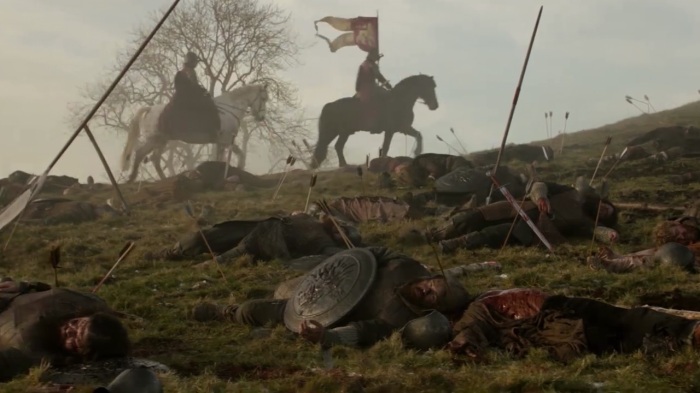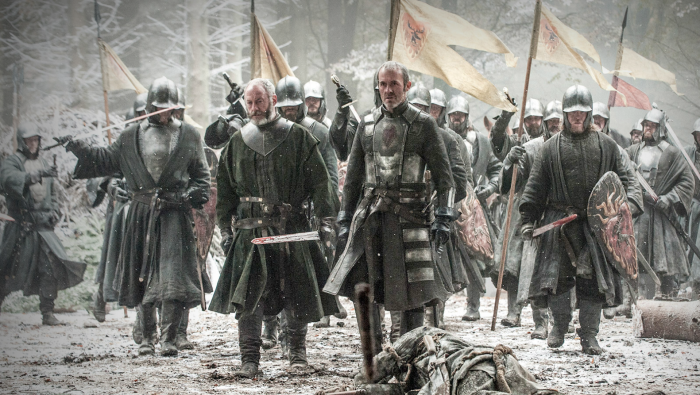
Game of Thrones: Atrocity Exhibition
Disdain towards the Middle Ages mainly stems from identifying technological development with the moral development level of a given epoch as the principle for moral evaluation. However strange it may seem at first glance, postmodern man has no real problem with the standard shortcomings of the medieval humanity he loves to abhor and ridicule: the violence, blind faith, unbridled lust for power and corresponding immutability of social stratification, insignificance of the individual, etc. For some reason, only barbecuing witches always pops up as ‘the’ crime of that epoch, although the practice was very much a Renaissance phenomenon. Meanwhile, as the top hot dog among them, we are treated to hagiographies of Giordano Bruno, an occultist, obscurantist, spy, and manipulator surprisingly similar to political-marketing experts of modernity like Edward Bernays, as the late Romanian philosopher Ion Culianu has aptly shown in his book Eros and Magic in the Renaissance.
Contemporary man has no real problem with any of this, still less than with confusion between the Middle Ages and the Renaissance. In fact, it seems he likes the cruel misadventures of medieval man. Does this mean modern man is a brute who will enact all those deplorable things we just listed? No. He is just a brute imagining enacting them on a spectacular scale. In postmodernity that’s more or less the same thing.
The enormously popular HBO series Game of Thrones is a glaring example of just how fascinated with the Middle Ages contemporary people are. Admittedly, not with the Middle Ages of Saint Thomas Aquinas and Meister Eckhart, but with the re-imagined – in itself highly fantastical – era of betrayal, violence, decapitations, human barbecues, and the ruthless game of power. It is all so very acceptable as a spectacle and, at first sight, harmless, as “real life” is still being conducted in a suitably moral manner, where no flies are being harmed and no ugly girls are being fat-shamed. Yet then there comes a second look, and a highly damning one at that. “Enlightened” societies are not illuminated by the light of reason – itself an eminently medieval, and hence discarded, term – but precisely by the neon light of on-screen spectacle. The real raison ‘d etre of contemporary society is literally to provide an opportunity to see and to be seen, and unqualifiedly so. It gingerly shifts real pain and suffering to the margins of focus, occasionally endowing designated victim groups with religious reverence, and projects as its own center a pure, moving image. To be in the image, to be imagined, is the sole purpose of life, as is becoming aptly obvious through the phenomena of the “selfie” and amateur sex videos; this is far beyond fashion or even a sign of decadence. It is a meaning of Being. One doesn’t need the likes of Heidegger or Deleuze to figure that one out. Just take the Game of Thrones series.
The series in question is a perfect vehicle for what postmodern reality is intended to be – an enormous playground for individuals and groups in perpetual struggle, displaying an infinite range of emotions, motives and moral stances, always betraying viewers’ expectations. The noble are killed in a most gruesome manner, while the wicked are elevated, only to be shown, a few episodes latter, to be not so wicked, moreover, becoming even nobler than their victims; the culmination of plot tension is regularly resolved in a completely random manner, defying the rules of drama supposedly to affirm the rules of reality. But: what reality? All of this is being played out in an imaginary medieval world of swords, burnings at the stake, castration, rape, crazy religions, and fire-breathing dragons. The plot scatters in all directions through the lives of numerous characters with forgettable names, always indicating that something lurks behind the next corner, and then ruthlessly betraying spectator expectations. And the spectator loves it. All that brutal reality, tough love betrayed for a few coins, friendship discarded over politics, an erect phallus chopped off when it could have done so much good work in further episodes.
That entire medieval world. The tragedy of it. The comedy of it. “Real life,” where victim groups are really victims grouped in a heap of mangled bodies, and all those forbidden fruits of racism, sexism, and homophobia are up for spectator enjoyment. The spectator imagines himself in the midst of it, amongst the heroes and heroines of this bloody anti-drama, making little thought experiments as he or she watches. “What would I do?” “Isn’t this just like in real life?” “I would stand by his side” “I would tell her to betray him.” Without immersion the spectacle is nothing. And now, when the means of immersion are being developed to perfectly imitate life, the spectacle becomes the reality. The only peculiar thing is, why do they all love the Middle Ages so much?
First of all, the Middle Ages were something rather different from what contemporary men imagine them to be, yet why is this image so popular with the masses who have accepted political correctness as their state religion? Could it be a sign of rebellion? No. Acts of rebellion can vary, but watching TV is most certainly not among them. On the contrary, we are observing an act of compliance, the act of accepting the world as it mutates into virtual reality, and political correctness slowly prepares us for acceptance of politically-correct violence.
It is a peculiar thing how terms are inverted over the course of history. ‘Virtual’ in fact means ‘real’ as opposed to ‘imagined’ or ‘illusory’, much like the ‘dynamic’ originally denotes inertia of matter and modal category of possibility, while today it is an expression of activity and energy, i.e. its direct opposite. Now virtual is becoming its proper self again. And if we live in a virtual world, does this mean we can walk through walls? Yes, it does. Admittedly not yet, but we’ll be able to do so by 2050, as Ray Kurzweil triumphantly informs us. The posthumanist dream is an appropriate term to denote postmodern reality, because it is a dream and it is inhuman. An actual ability to re-imagine the world in crudely material terms, to make it what the spectator wants it to be, is a promise which will be betrayed, of course. But that doesn’t make it contradictory, because betrayal of expectation is the essence of the imaginary, as Game of Thrones artfully displays. It is always ‘almost, but not yet’, the resolution is around the corner, but – blast! – there’s still another corner and another curved path, and on, and on.
There’s nothing strange about our situation once we realized we are immersed in dream logic. Saint Augustine thanked God for not being responsible for his own dreams. Plato pointed out ‘the many headed beast’ in man that awakens in dreams, and which tyrants just love to feed and nurture in their populace’s minds by means of sound and vision. What has the postmodern spectator to say for himself? His dreams are projected on to screens for anyone to see, and they are becoming reality. And he is quite responsible for them; no use of fooling God to the contrary. He won’t be fooled.
What happens when the imaginary morality we call political correctness get recast in the fashion of the imaginary Middle Ages? Desire is manifest, and possibilities are vast. The choice of nightmares has been made, but it can always be remade. Everybody wants to imagine himself in a world of real violence and never-ending outgrowths of plots, the eradication of identity, the dissolution of good and evil, beautiful and ugly. On the condition, of course, that they don’t get their hands dirty. No worries. If Kurzweil can make brick walls diffuse, then he can very well give you a new pair of hands and new morality, though he need not bother. Morality is already dissolving, as displayed in images that the man of the Middle Ages could hardly conceive without taking an ascetic penance or at least heading to confession. An atrocity exhibition is projected onto our screens as the true content of the soul of postmodern man, not as the content of the outside world.
The screen is to exchange reality, as transition into the posthuman world demands. And the images on that screen should be an infinite game projected by the worker bees of postmodernity, controlled, observed, and occasionally punished by citizens of the world forever at the very edge of precipice, but also forever not yet over it. We can clearly observe what those images are. In their most perfect form, they are a distilled essence of primordial violence projected into the despised medieval world, a virtual Age of Transition to be forever played out and to forever betray every expectation. The censorship of artistic expression in general, now present only to protect designated victim groups, was not necessarily an act of repression in the past. It could have very well been an act of protection. Because, while in the past ages nobody in his right mind would try to censor reality, which was always present in abundant quantities, the symbols and thoughts of man were quite different and – dare we say – quite sublime, carefully crafted and protected. The emotional and philosophical content of a medieval romance would be ridiculed by the contemporary consumer of pornography, or, for that matter, your average TV viewer. It is all so unreal.
Are we to believe that the Middle Ages never discovered the tragedy of existence, Heidegger’s Dasein was still verborgen and unentschlosen? That they knew nothing of conditio humana, of the unceasing pain of it? Perhaps they really didn’t. I remember a few years ago, while doing some manual work on archaeological digs, how I dug up a 14th century grave. It was only a casket-shaped hole, walled by flat stones on the sides and topped by three big stone plates covered with earth. Nothing fancy, no pottery inside, no pieces of metal, just a female skeleton with the infant laid on top of her. The child’s little skull was split up on top as it died before the bones had chance to harden, and little milk teeth were still in its jaw, as white as in a toothpaste commercial. Perhaps they were mother and child, or maybe their fellow men just didn’t bother to dig an extra grave for someone else’s kid. They were peasants in the God-forsaken land between the East and the West, living out their lives on the barren rocks of Dalmatia’s backwoods, even today considered to be the middle of nowhere, in the last, and probably the darkest, century of the Middle Ages proper. Well, I thought to myself then, what would they tell me about themselves, these ancestors of mine who inhabited our God-forsaken land, if I asked them was there any meaning to their living and dying? I think the woman would just shrug off the question, as women usually do when men start playing their games of conquest, intellectual or otherwise.
Or, maybe, seeing me so desperate in my existential angst, the woman would have pity and give me an answer. She would in all probability point to the skies, as there were no cathedrals in the vicinity at that time, no elaborate visual depictions of medieval metaphysics – projections of the era’s soul – so she would have to stick to the obvious in the hope that I’d get it. If this should be the answer of the medieval woman to her postmodern male simulacrum, smoking a cigarette while sitting on the edge of her sepulcher, then I declare my defeat by the riddle of this Sphinx. Our skies are to become a screen for the insane imagination of virtuality, the playground of makeshift angels watching over virtual souls, with no sense in pointing to them. Almost immortal, but not just yet; almost perfect, but not just yet; almost dead, but not just yet; almost at the end, but forever not just yet. Violence alone is our language, the violence of the soul projecting its cruel dreams into the world, remodeling it through myriad of gadgets, exploiting it ruthlessly – yet making it safe for callow enjoyment – never harming flies or fat-shaming anyone, yet baying for blood more savagely than the wolf. Only a plenum of worker bees pulses through the neon world-hive, playing their game of drones, projecting themselves in all three dimensions of time, striving for eternity, forever bowing to their own image.
If this is the future, and it is what’s implicitly imagined by postmodernity, then no Kurzweil nano-bots for me, no organ transplants, no cyber-sex, and no immortality, please. Just an opportunity to dig up that grave once again, smoke one more cigarette for the road, and then bury myself and my shame in it. For if this game of drones is the final human comment on history, if this is humanity’s triumph – the CGI-recreated never-ending spectacle of savagery and inconsequence – then those two skeletons are the only noble company with whom to share eternity. If some Kurzweil-like metaphysical psychopath will finally provide humans with the possibility to remodel the world in their own image, then a medieval peasant’s shallow grave seems an acceptable lodging; an adequate respite from the insult man has become, a good depot for the last man to intern his shame.
For spectator-man, the pain of life was never smaller, and the urge to inflict it never greater. His hands are free of blood, while his soul drowns in it. So it goes with the soul – this thing its possessors don’t even believe exists, though its closer to them than they are themselves – it holds its own judgment, whether we like it or not. “Despicable” medieval man knew beauty; we know that because his soul left its trace in stone. What trace will postmodern man leave? None, it’s not his business to make traces, but to erase them. To ensure the scam of the perpetual sold as the Eternal, the “perpetual” traditionally being known as a main feature of Hell.
Behold, then, the game of drones, rats in the labyrinth deified in image, moving icons worshipping themselves. The final judgment infinitely delayed, run perpetually through ever-branching tunnels, painting a chrome film across the heavens to close them like a tin can. The skies closed shut, not by avenging angels, but with high-conductivity particles or other works of man’s own hands. A perpetual TV party for drones, always about to commence, but not just yet. The sky becomes but a screen for everyone to see what I, always I and only I, have to offer to the pleasure of my eyes. A great “selfie” of Pantokrator.
So make room for me, skeleton-girl. It’s really snug in here, though I obviously don’t mean to fat-shame you. Embrace this prodigal son, dying of shame because he is human, almost dead… but not just yet.
Branco Malic is editor of Kali Tribune.






No comments:
Post a Comment